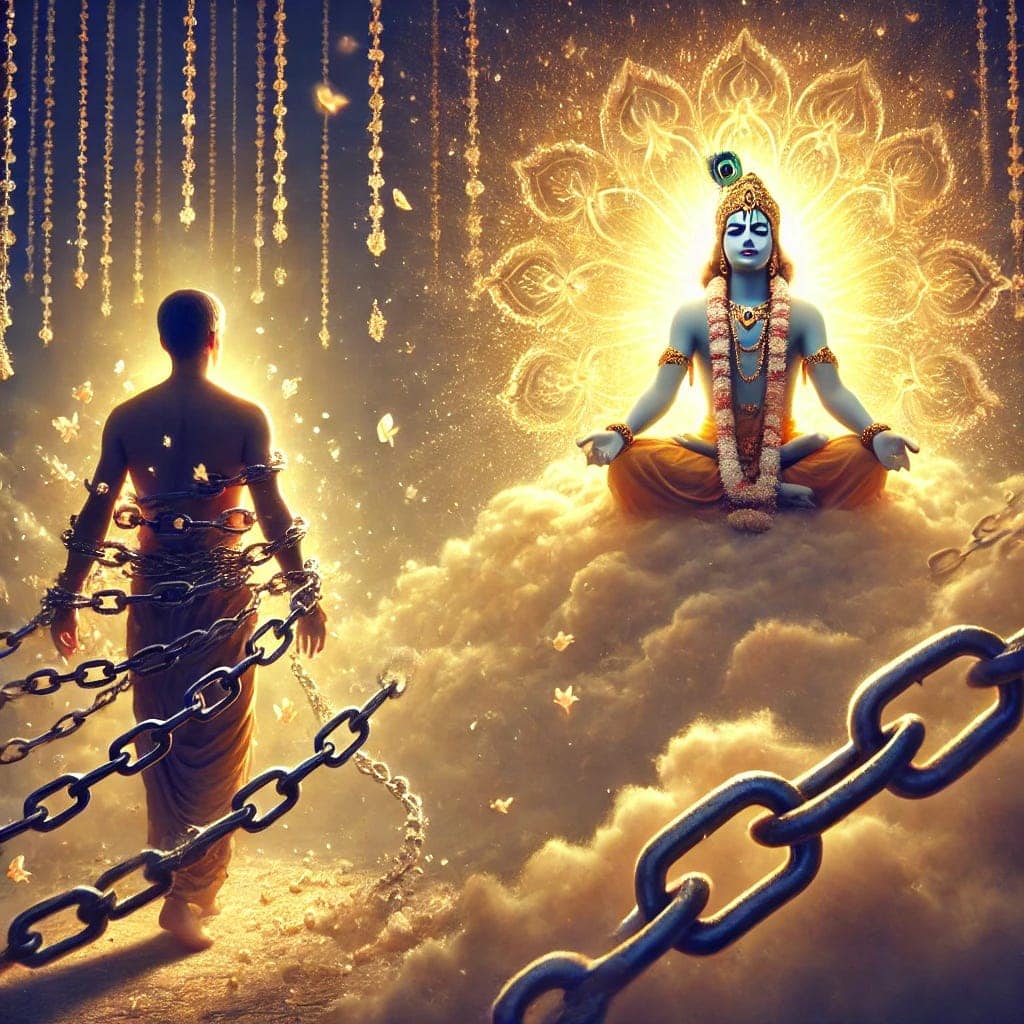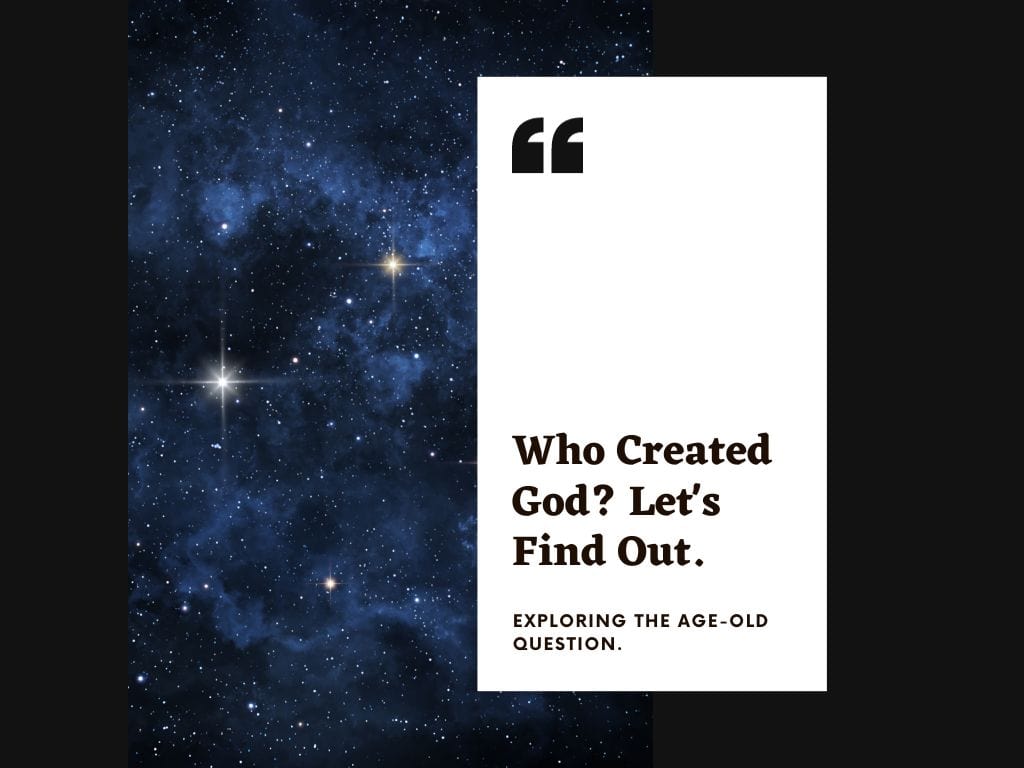Contents of the Article
The Weight of the Glass
The students responded with varying guesses.
The teacher smiled and said, “The weight doesn’t matter. What matters is how long you hold it. If I hold it for a minute, it’s light. If I hold it for an hour, my arm will ache. If I hold it for a day, I’ll be paralyzed.”
She continued, “The ego is like this glass of water. The longer you hold onto it, the heavier it becomes. Devotion is the act of putting the glass down and trusting that the divine will carry it for you.”
The Ego: Chains of Illusion
The ego is a master of disguise. It convinces us that our identities are tied to roles, possessions, and achievements. In Chapter 3, Verse 27 of the Bhagavad Gita, Lord Krishna reveals the illusion that the ego perpetuates:
“While all actions are actually carried out by the attributes of material nature, one whose intelligence is deluded by ego (resulting from identifying oneself with the body) thinks, “I am the doer.” [BG 3.27]
This false identification with the ego chains us to the outcomes of our actions, leading to anxiety, attachment, and pride. When success comes, the ego swells with arrogance; when failure strikes, it crumbles into despair. This cycle keeps us trapped, disconnected from the eternal truth of who we are.
Imagine an artist who creates a beautiful painting but becomes so attached to its reception that their joy depends entirely on others’ approval. This is how the ego operates, chaining us to external validation.
Devotion: The Path to Freedom
Devotion, or bhakti, offers an antidote to the ego’s chains. It shifts the focus from “I” to “Thou,” from the limited self to the boundless divine. In Chapter 18, Verse 66, Krishna extends this liberating invitation:
“Abandoning all forms of engagements (unnecessary material and religious activities), take refuge in Me alone. I will liberate you from all sins. Do not grieve.”
Surrender, a cornerstone of devotion, is not an act of weakness but one of immense strength. It means letting go of the ego’s need to control and trusting the divine wisdom that pervades all existence. This surrender liberates the soul from the bondage of fear, doubt, and attachment, replacing them with peace and freedom.
Arjuna: From Ego to Devotion
A compelling example of transformation from ego to devotion comes from the life of Arjuna in the Mahabharata. At the start of the Kurukshetra war, Arjuna finds himself paralyzed by doubt and grief. His ego clouds his judgment, making him question his role, his relationships, and even the morality of the battle he is destined to fight.
Arjuna’s dilemma is not unique; it mirrors the struggles of anyone who feels overwhelmed by life’s responsibilities and choices. The ego, with its attachments and fears, magnifies our challenges, making us lose sight of the bigger picture.
In this moment of crisis, Lord Krishna, his charioteer and guide, steps in to dispel the illusion. Krishna’s teachings in the Bhagavad Gita are not merely philosophical; they are a direct path from ego-driven confusion to the clarity of devotion. In Chapter 2, Verse 47, Krishna advises Arjuna:
“Your right is indeed to perform dutiful actions, but not to the rewards. Never consider yourself as the creator of the rewards of actions, and there must never be an attachment to inaction.”
This instruction challenges the ego’s obsession with outcomes and redirects Arjuna’s focus to selfless action. As Arjuna surrenders to Krishna, his despair dissolves, replaced by a renewed sense of purpose. By aligning his actions with Krishna’s will, Arjuna discovers freedom—not from the battle but within it.
This shift from ego to devotion is a lesson for all of us. Whether faced with personal dilemmas or larger life challenges, surrendering our ego and acting in alignment with divine will liberates us from fear and attachment. Arjuna’s journey reminds us that true strength lies not in asserting control but in trusting the divine plan.
The River and the Ocean
Consider the journey of a river. As it flows, it carves paths, nurtures life, and sometimes rages with the illusion of its own independence. The river, with its defined banks and identity, symbolizes the ego—separate, striving, and often restless.
But what happens when the river meets the ocean? It surrenders. Its individuality dissolves, yet it doesn’t lose itself. Instead, it becomes one with the infinite, embracing the vastness of the ocean’s depth and power.
In the same way, devotion is the journey of the soul returning to its source. The ego, like the river, clings to its separateness, believing that control and resistance are necessary for survival. Devotion, however, invites us to let go of this resistance, to flow toward the infinite with trust and love.
The Bhagavad Gita captures this beautifully in Chapter 7, Verse 14, where Krishna says:
“Indeed, this divine illusion of Mine, consisting of the modes of material nature, is difficult to cross over. Only those who take refuge in Me can cross over this illusion.”
The ego believes it must navigate life’s challenges alone, but devotion reminds us that surrender is not a sign of weakness—it is a profound acknowledgment of our connection to the divine. When we let go of ego and align with devotion, we become like the river merging with the ocean: free, expansive, and infinite.
This metaphor serves as a gentle reminder that in surrendering the ego, we don’t lose ourselves; instead, we discover the limitless joy and peace of divine union.
Ego in Everyday Life
The chains of ego manifest subtly in our daily lives:
In Relationships: The ego demands to always be right, creating conflict and alienation.
At Work: The ego ties self-worth to titles and accomplishments, leading to burnout or dissatisfaction.
In Spirituality: The ego can even disguise itself as spiritual pride, creating a sense of superiority over others.
Devotion dismantles these chains by reorienting our perspective. Instead of seeking validation, we begin to see our actions as offerings to the divine. Relationships become harmonious, work becomes purposeful, and spirituality becomes a path of humility and love.
A Practical Path to Bhakti
Here are steps to cultivate devotion and dissolve the ego:
Daily Surrender: Begin each day with a simple prayer: “I surrender my thoughts, words, and actions to You.” This practice helps reframe challenges as opportunities for growth.
Seva (Service): Engage in selfless acts of service without seeking recognition. Serving others with love erodes the ego’s hold.
Chanting and Meditation: Repeating the name of the Lord or meditating on divine qualities aligns the mind with higher truths.
Reflect on Stories: Reading and reflecting on stories of great devotees like Meera, Prahlada, or Hanuman inspires faith and devotion.
Gratitude Practice: Cultivate gratitude for everything in life, seeing it as a divine gift. Gratitude melts the ego and fosters humility.
The Freedom of Bhakti
When we surrender the ego, we discover a freedom that is boundless and joyful. The Bhagavad Gita assures us that this path is open to everyone:
“Even if a man of abominable conduct worships Me, devoted to no one else, he should indeed be regarded as a sage, because he is rightly resolved.” [BG 9.30]
Devotion requires no preconditions, no perfection. It only asks for sincerity and faith. When we let go of the ego and embrace bhakti, life becomes a dance of divine grace, free from the chains of attachment and pride.
Bhakti teaches us that the love of God is not found by clinging to the ego but by letting it go. In doing so, we are no longer chained but truly free.





